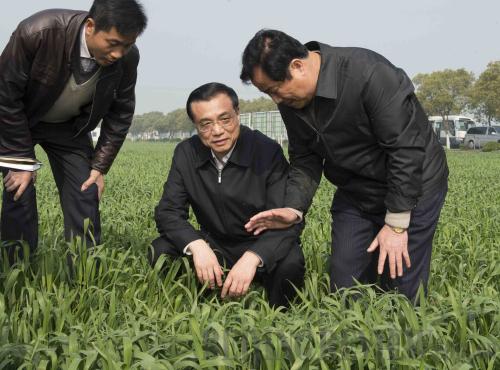|
 |
|
FIELDWORK: Chinese Premier Li Keqiang (center) visits a family farm in Changshu City, east China's Jiangsu Province, on March 28 (LI XUEREN) |
As China urbanizes, more and more farmers are moving to cities in search of better-paying jobs, abandoning agricultural work and leaving tracts of farmland deserted and fallow.
Official figures show that 52.6 percent of China's population lived in urban areas at the end of last year. It is estimated that the country's population could reach 1.5 billion by 2030, with only 30 percent, or 450 million people, living in rural areas.
In the long-term, a great number of rural people will leave the countryside and become pure consumers of grain instead of producers, which will put more pressure on grain supplies, said Duan Yingbi, former Director of the Office of the Central Leading Group on Rural Work, the country's top agricultural policy-making agency.
According to the National Bureau of Statistics, China's grain output rose 3.2 percent in 2012 to hit a record high of 590 million tons, marking the ninth consecutive year of growth. However, last year's official customs figures showed the country's grain imports also reached an all-time high of 72.3 million tons, evincing a strained balance between domestic grain supply and demand.
Encouraging young farmers to stay in their hometowns and grow grain has become an urgent problem in terms of maintaining food security, said Yin Xiaojian, Deputy Director of the Rural Economy Institute of the Jiangxi Provincial Academy of Social Sciences.
In order to tackle the problem, the Chinese Government said at the Central Rural Work Conference last December that it would strive to create systems that are more organized when it comes to agricultural production and operation. The government also pledged to increase support for new types of businesses, like family farms and specialized cooperatives.
The policy document issued on January 31 said that efforts will be made to accelerate rural land transfers to encourage development of bigger, specialized farming units, including family farms and farming cooperatives. The term "family farm" was repeatedly emphasized.
Chinese Premier Li Keqiang also stressed the importance of developing modern agriculture and "moderate-scale management" to improve farmers' incomes during a research tour of the Yangtze River Delta in late March. "To develop modern agriculture through joint partnerships, family farms and agricultural cooperatives are China's prime directive," Li said.
Large-scale farming will improve land and labor efficiency and provide firm support for urbanization, Li said, adding that farmers' interests should be protected in the process.
According to the local government of Changshu, the value of agricultural output in the city reached 6.27 billion yuan ($1.01 billion) in 2012, up 10.5 percent from the previous year.
| 